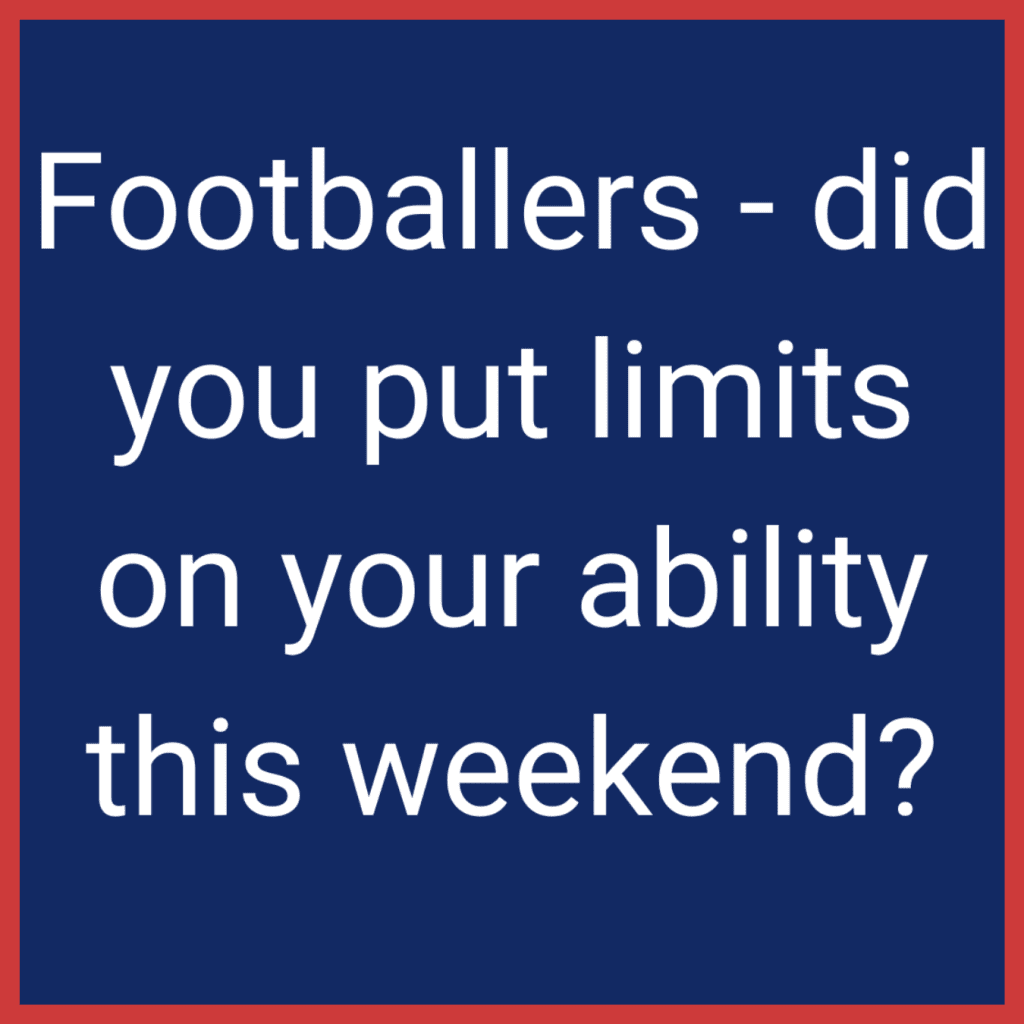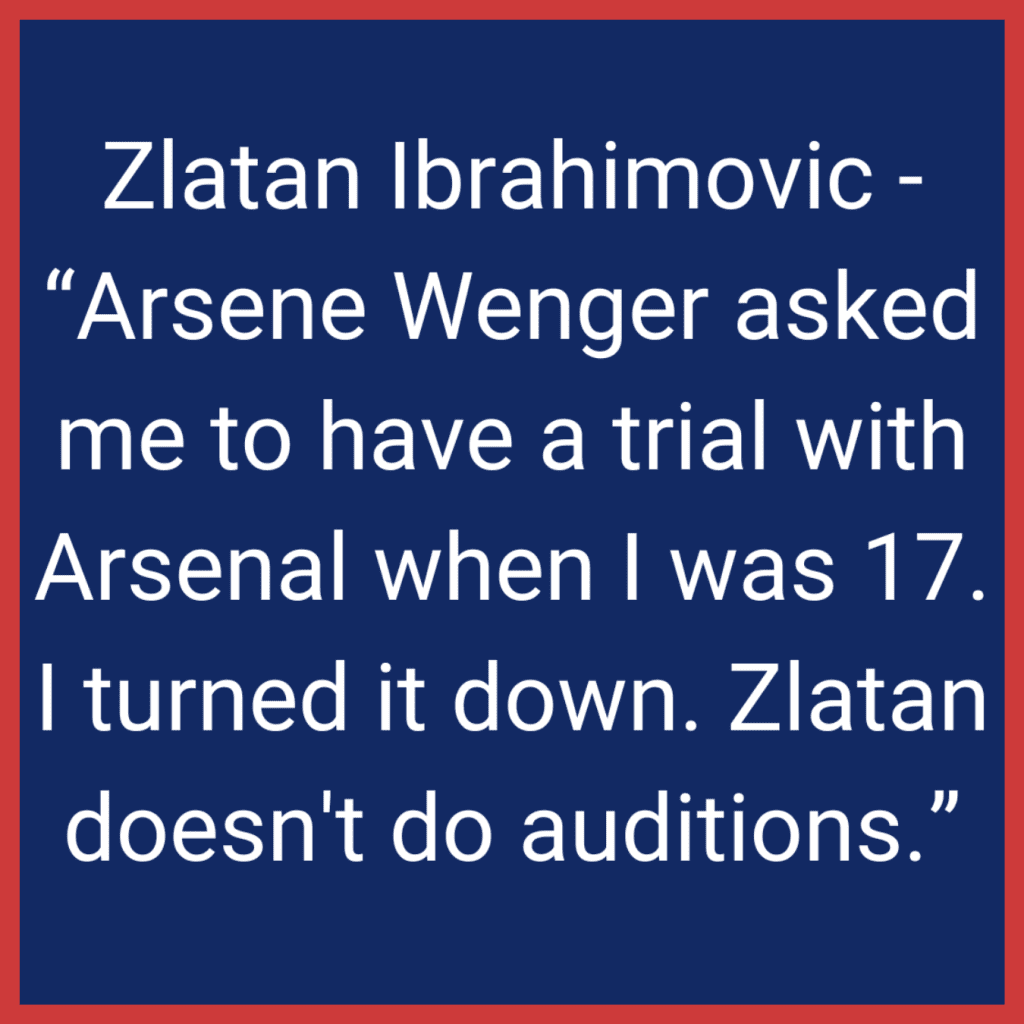13 December 2023

Developing The X-FACTOR To Transform Your Football Performances
How to Overcome Self-intimidation
A great way to ensure that you start a match “one-nil down” is to place too much emphasis on your opponents. Many football and soccer players do, they scroll social media and the internet for snippets of information before their matches whilst also hanging on to every word said by their coaches in the build-up to matches. The result is a football or soccer player who falls foul of “comparisonitis” and is easily intimidated going into matches.
By comparing yourself to your opponents, many footballers get into the way of thinking that their opponents are almost perfect and much better than you. Your opponents are put on a pedestal and you then forget about your strengths and role in the team.
When self-intimidation occurs
On the football pitch many players look to gain an edge by seeking to intimidate their opponents with their body language, by using snide comments and by being overly physical and aggressive. However, it’s often the case that some football players do this too themselves anyway, psyching themselves out.
Examples I’ve come across include:
- When football players are faced with bigger, physical and aggressive opponents, they can often retreat into their shell.
- If their team has lost to a team previously, they worry they’ll lose again and play in fear.
- Playing in a big stadium, against better opponents on paper some football players can be intimidated and worry that they will embarrass themselves.
- The self-conscious footballer who tracks back with their opponent, can be half-hearted in their attempt to win the ball in case they mistime their challenge and their opponent beats them and goes on to lay on a goal or score. They’re scared of being embarrassed and would rather not put the effort in to track back.
When “judgement mode” kicks in
The main culprit here is where football players judge the quality, size or skillset of their opponents, they also begin to judge and try to predict outcomes ahead of time. The result is feelings of worry, nervousness, helplessness and fear which plays havoc with your confidence.
To sum up, when you make comparisons with your opponents, your focus is misplaced, you start to believe that your opponents are better than you and you look at the negative aspects of your performance. You’re only thinking of what’s wrong with you, you then become ultra self-critical on the pitch, judging negatively your every touch, pass or tackle.
How can you help yourself maintain your confidence?
Step one – is to set yourself some rules about how much time you will focus on your opponents and when you do so. A word of warning, for some football players the closer you get to a match, when the butterflies kick in is not a good time to be focusing on opponents.
Things you or your players should consider:
- How video analysis is conducted.
- What conversations are taking place about opponents in the build up to matches.
- Your use of the internet and social media when “checking out” opponents.
- Where you place your focus in the warm-up.
- If you start “one nil down” against specific teams.
- If you feel in awe of your opponents.
- If you feel inferior to your opponents.
Step two – is to place the rules that you have created somewhere handy in the run up to a match and look to catch yourself when you break some rules and spend too much time focusing on your opponents.
Step three – is to focus on your own strengths and skillset not your opponents. That’s easy isn’t it!! For some players it’s very difficult, therefore I’d encourage you to make a list of your strengths as a football player.
Step four – don’t put your opponents on a pedestal, seek to flip the situation. Consider how you can use your strengths to intimidate your opponent and make their match as difficult as possible.
You may also be interested in the latest episodes of the Demystifying Mental Toughness podcast where we have a focus on improving footballers decision making and managing footballer players expectations when your team is winning comfortably.
WORD OF THE DAY
Intimidation
“The action of intimidating someone, or the state of being intimidated.”
We’ll look to explore the act of intimidating someone. Consider a top professional football player who intimidates others. What is it about them that makes them intimidating? Is it their body language? The look in their eye? How they speak to others (tone)? What they say to others (words)? Their physique or size? Their skillset perhaps? Their trophy cabinet? Their work ethic? The way that they bounce back when they are faced with difficulties? The own story that they tell themselves about themselves and their opponents? Now consider what you can take from this, what factors are within your control that you can act on.
CHECK US OUT ON INSTAGRAM WHERE YOU’LL FIND IMAGES AND POSTS LIKE THIS

🚧 Footballers – did you put limits on your ability this weekend?
⚽️ Perhaps you were quiet at the start of the match.
⚽️ Perhaps when you came up against big aggressive opponents.
⚽️ Perhaps when you were faced with highly skilled opponents.
⚽️ Perhaps after you made a few mistakes.
⚽️ Perhaps because you felt uncomfortable in a new position.
⚽️ Perhaps because you received some negative feedback from a coach.
🧠 On occasions putting limits in place can work for you, as you’ll invariably not perform up to the standards that you set and you’ll learn better and new approaches.
🧠 However, a better approach could be to have a “no limits” mentality where you display an arrogance and air of confidence that champion footballers have.
TO DO LIST:
WATCH – The Greatest Haka Ever
LISTEN – Ep 207: Nicole Posner – And Breathe: How To Prevent, Manage and Master Difficult Conversations
READ – Mental toughness when playing rough teams with Patrick Cohn
EXPLORE – what a great player, for example Ronaldo, who can out psyche opponents easily, may be thinking, how he feels and his typical behaviours on the football pitch that ensures he puts in a solid 7/10 performance. Then consider the differences between his 7/10 performance and his 9/10 performance. Would his thought process be different, would the emotions that he experiences be different and again what behaviours would you see on the pitch.
FACT – There are many behaviours on the football pitch that you can control. For example, your body language, your bravery when taking players on, your effort when tracking back, your commitment to tackling, whether you choose to stay on your toes and if you decide to bounce back from mistakes quickly or dwell on them.
TIP – Make focusing on the things that you can control your superpower. You’ll then become much better at putting to one side the oppositions size, skills, performance levels and attitude.
QUOTE – Zlatan Ibrahimovic – “Arsene Wenger asked me to have a trial with Arsenal when I was 17. I turned it down. Zlatan doesn’t do auditions.”
THOUGHTS – This quote by Zlatan could be viewed in various different ways depending on your values and opinions. To some it could be regarded as arrogant whereas to others it could be seen that Zlatan oozes self-belief. In the UK, many people can be regarded as guarded and don’t like to show-off or be regarded as shouty. However it’s worth considering that “Only you can sell yourself” and that taking responsibility for your own success and actions is a skill that can promote self-confidence. If you’re humble too and show your vulnerabilities then it may not be a bad thing.

SHARE THE X-FACTOR
Share The X-FACTOR with your friends, family and colleagues, and create a positive difference to the lives of more football players, coaches, parents and enthusiasts.

Best Wishes
David Charlton
Online Sports Psychologist | Mental Performance Coach who supports many highly motivated athletes, young and old, developing their skills or who are already highly skilled so that they gain a mental edge and get the most from their talent across the globe from USA/Canada to Great Britain and Ireland to UAE, South Africa, Australia and New Zealand, using ONLINE Video Conferencing.
Managing Director – Inspiring Sporting Excellence
Host of Demystifying Mental Toughness Podcast
Founder of The Sports Psychology Hub
Author of The Mental Edge
With over a decades’ experience supporting athletes, coaches, parents and teams to transfer their skills from training to competitive situations, under pressure.
T: +44 7734 697769






